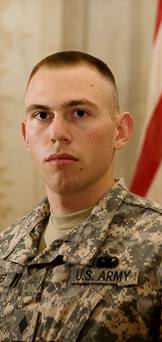Stephen Hammer arrived at Princeton planning to focus his studies on contemporary public policy. But that changed when he read "On Duties" by the Roman statesman and orator Cicero in a political theory class.
Cicero's notion of how to live a moral life crystallized for Hammer the importance of living ethically and redirected his academic interests. Cicero gave Hammer "an appreciation of the way Romans looked at morality," he said, a concept Hammer explored in greater depth after becoming a classics major.
Hammer's own commitment to duty will lead him to serve in the Army after graduating from Princeton and serving as a Rhodes Scholar. He plans to address the subject of service to one's country at Commencement June 2, where he will continue the tradition of giving a speech in Latin as the class of 2009 salutatorian.
Hammer, who is from Carrollton, Texas, has been interested in military service since high school, and was drawn to Princeton because it offered an outstanding academic program and an opportunity for him to participate in ROTC. "Princeton stood out for its support of ROTC," he said.
His military service will be in the infantry, which Hammer selected because "it's the backbone of the Army, where the fighting gets done. I felt like that's where I can make the most difference." He will most likely start off as a platoon leader. Joining the Army while the United States is fighting two wars appealed to Hammer because "this is the time when the country needs us most of all," he said.
Robert Kaster, the Kennedy Foundation Professor of Latin Language and Literature, said Hammer is deeply committed to studying issues of right and wrong.
"Stephen brings more intensity to all his commitments -- his academic work, his national service, his religious beliefs -- than any other student I can readily recall, and that exceptional intensity should lead to exceptional contributions," Kaster said.
Before undertaking his military service, Hammer will spend two years at the University of Oxford on a Rhodes Scholarship, earning a master's degree in theology. His study of the early Christian church will leave him better prepared for a leadership role in the Army by offering a historical and theological understanding of the intersection of faith and public service, he said.
At Princeton, Hammer earned the fourth-highest GPA in the senior class and received the University's Shapiro Prize for Academic Excellence. He only took beginner's Latin in high school and started Greek at the University, which makes his achievement all the more noteworthy, said professor of classics Harriet Flower.
"Stephen is a student for whom Roman history is not just ancient history," Flower said. "For him, Roman statesmen can provide models for appropriate, effective and morally informed behavior in the present."
His senior thesis examines the political philosophy of Cato the Younger, a statesman in ancient Rome who intrigued Hammer because he "stayed true to his ideals even though it cost him his life. He created a new paradigm for how to be a Roman statesman," said Hammer.
"Stephen was attracted by Cato's dedication to his country, by his steadfast adherence to his ideals and by his readiness to make personal sacrifices on behalf of those ideals," Flower said.
During his time at the University, Hammer was baptized at Nassau Presbyterian Church, an experience that he said "changed my whole life." He went on to serve as a peer minister with the Princeton Presbyterians campus ministry.
In addition, Hammer has volunteered with the Trenton Area Soup Kitchen, contributed to student-run foreign policy and political publications, and held internships with the Dallas County (Texas) Criminal District Attorney's Office and the Atlantic Council of the United States, a Washington, D.C.-based think tank. He also played lead saxophone in the Princeton University Jazz Ensemble.
After completing his service in the Army, Hammer is planning to attend law school with the hope of one day becoming a judge.


